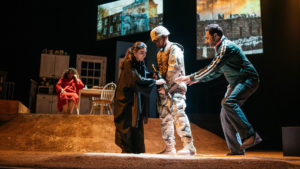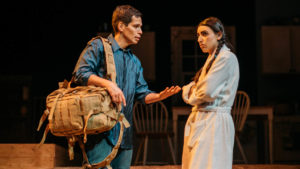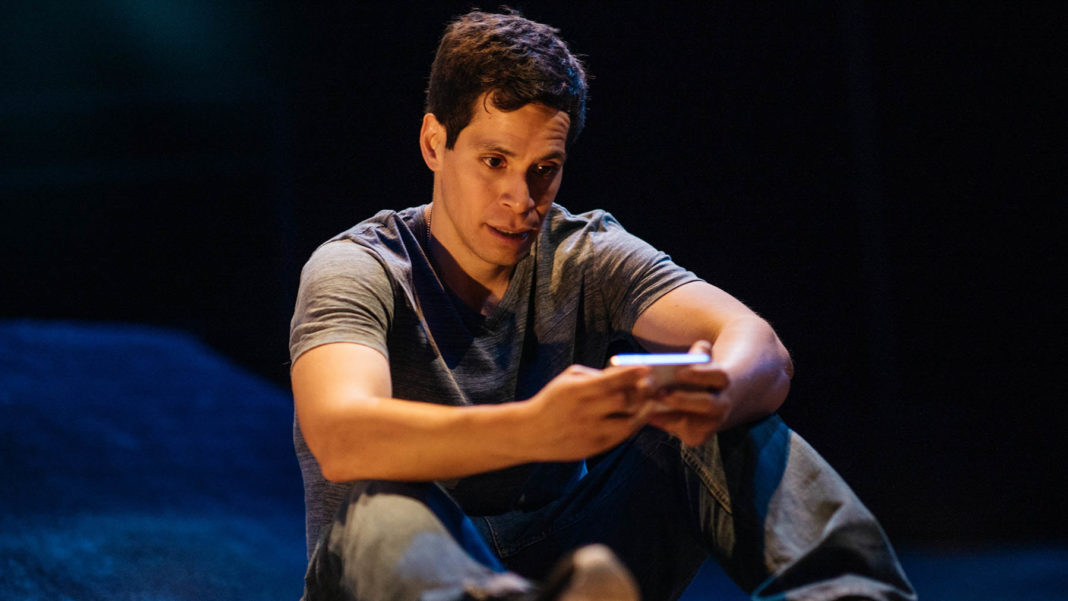This is the third (and last) in a series of interviews with each actor who plays “Elliot†in the trilogy of plays by Pulitzer Prize-winning playwright Quiara AlegrÃa Hudes. This interview is with Peter Pasco who plays Elliot in The Happiest Song Plays Last which continues through March 19th at the Los Angeles Theatre Center. Hudes was inspired to write this trilogy based on the experiences her cousin, Elliot Ruiz, had serving in Iraq.

Because you are playing Elliot in the third play, you have as resources both the scripts for the two previous plays (Elliot: A Soldier’s Fugue and Water by the Spoonful ) to fill in the backstory of your character and to see how they are being staged. What did you learn from the scripts and the two productions?
It’s interesting in my mind because I looked at the productions as a whole than say as individual performances. I got more of an overall sense of how each production would bring life to Quiara’s words. I had no idea how Elliot would work. I thought that was going to be the most challenging one because of the format; because of the way the fugue itself works. I was looking at it more from a directorial perspective. Water, I’d never seen a live production of it – the wonderful dynamic of being in two different worlds and the internet world. That is a huge challenge in and of itself. There’s a community there, but they are spread out and different locations. Those are the things that really stood out from the other two productions.
Did seeing the performances of the other actors steer you in one direction versus another for your portrayal?
If anything it reinforced the license that it could be entirely my own. It wasn’t like a relay race where we’re handing it off from one to the other. I think it would have been interesting if Center Theatre Group and Latino Theatre Company would have partnered more to see if that is something that would have created more of a common thread. That is something that stands out in a sense that the three of us are all very different.
Quiara, in speaking of her trilogy, has said that the Puerto Rican family story is truly the American family story. Do you agree?
She hit the nail on the head with that one. Let’s be honest, it could be any different culture. And I’m not trying to diminish the Puerto Rican element of it. But it could have been a Venezuelan family, a Nigerian family. It is representative of living in the confines of the United States and the seeds that have been sown and what’s grown out of that earth.

Elliot has a line in the second act of Happiest Song where he says, “You do have a choice. Choose to be something.” How have Elliot’s choices gotten him to where he is in the play?
That’s his mantra. There are a number of lines in the play that really speak to that. Like where he talks during one of the conversations with his cousin that he’s out there to make his mom’s memory proud. Choose to be something – that encapsulates the actual person and the person that Quiara has created three plays around.
Some of his choices in the plays are not pleasant and, in fact, have been problematic since the first play. Does Elliot come to accept the ramifications of his actions by the end of this play?
There really is no resolution. I think closure is an interesting word that gets used when terrible events happen to communities, town or countries, but I don’t think it’s necessarily tangible. Everyone suffers, grieves or struggles differently. There’s not a nice bow put at the end of everything at the end of Happiest Song. You don’t know. But there has to be an acknowledgement of what you’ve done in the past as you try to move forward.
What has the character of Elliot taught you?
I always had the idea that the things that you have, the things you carry, would be weighing on your shoulders. I think the character has taught me that it’s not going to weigh you down as much as it is going to walk side by side with you. It’s like your actions are your shadows that follow you.
What has Elliot Ruiz taught you?
That I don’t take enough chances in life. The brief interactions I’ve had with him are pretty astounding. He’s a really good raconteur. It’s surprising that he hasn’t written any of his stories or entered The Moth. There’s no way you could listen to his stories and not feel like you’ve gotten some sort of life lesson. You want to encourage your kids to be that fearless and soak up every drop of life just because you never know.
To see Part 1 on this series go here.
To see Part 2 of this series go here.












